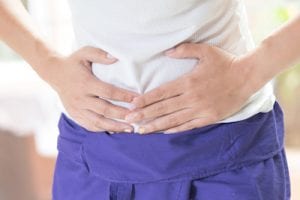Crohn’s disease is an inflammatory bowel disease that causes early menopause in women. It mostly occurs in the colon and the small intestine. The disease can range in severity, change over time, and can lead to various complications. This disease causes the digestive tract to swell as well as leads to abdominal pain, fatigue, malnutrition and weight loss. Crohn’s spreads deep into the bowel tissue. Although there is no cure for Crohn’s disease, there are various therapies that can help the patient feel better and avoid risk.
Possible Symptoms
Crohn’s disease is accompanied by symptoms such as poor appetite, sleep loss, hot flashes, fever, and rectal pain. The menopausal stage occurs when the woman no longer ovulates and her menstruation ceases. This happens prematurely in women with Crohn’s disease, normally between 41 and 45 years of age. It is usually a devastating time for women planning to have children.
The Disease Affects the Menstrual Cycle
In addition to the disease causing premature menopause, it also affects the woman’s menstrual cycle by causing intense cramping and pain. These symptoms usually last longer for women with Crohn’s compared to those without the disease. Medication can also cause irregular flow or even stop the menstrual cycle altogether. When this occurs, it can drastically reduce a woman’s chances of conceiving.
Weight Loss and Reduced Appetite
Crohn’s disease leads to reduced appetite in women. This is because the digestive tract is damaged and brings other complications such as the inflammation of the colon that can lead to colon cancer if the situation is not remedied immediately. The small intestines are inflamed as well and can lead to the deficiency of vital vitamins being absorbed into the body. To avoid further complications of the disease, it is important to nourish your body regularly. This may require therapy to nurse your body back to health.
Regular Abdominal Pain

Formation of Fistula
Fistulas occur when the ulcer extends beyond the intestinal wall. Fistulas tend to develop in the intestines, on the skin, and on other organs in the body. Fistulas can be extremely painful and unbearable. They develop in the abdomen and can cause drainage of the content from the bowel into the organs. If not acted upon, fistulas can be fatal.
Premature Menopause
Menopause often leads to unwanted symptoms and health risks in women. Crohn’s disease accelerates the aging of a woman’s body and can cause premature menopause, forcing her to experience symptoms that she would normally experience later around 50 years old.
Crohn’s disease causes reproductive and sexual problems for women. This is because the symptoms worsen and can bring about major health risks such as cancer or high blood pressure. A person with the disease should pay close attention to what they eat due to the malnutrition that accompanies it. They also have to eat foods that nourish them and nurse them back to health.
Living With the Disease
If you have Crohn’s, it is essential that you are in constant communication with your doctor before changing your diet. This will ensure that your symptoms don’t worsen. Take medications and therapy sessions seriously because Crohn’s does not have a cure. Although this disease can be painful, you can live a reproductive life with Crohn’s disease, and the menopausal stage is a chance of becoming a better person. A healthy diet will help you manage the symptoms and allow your medication to work more effectively.





